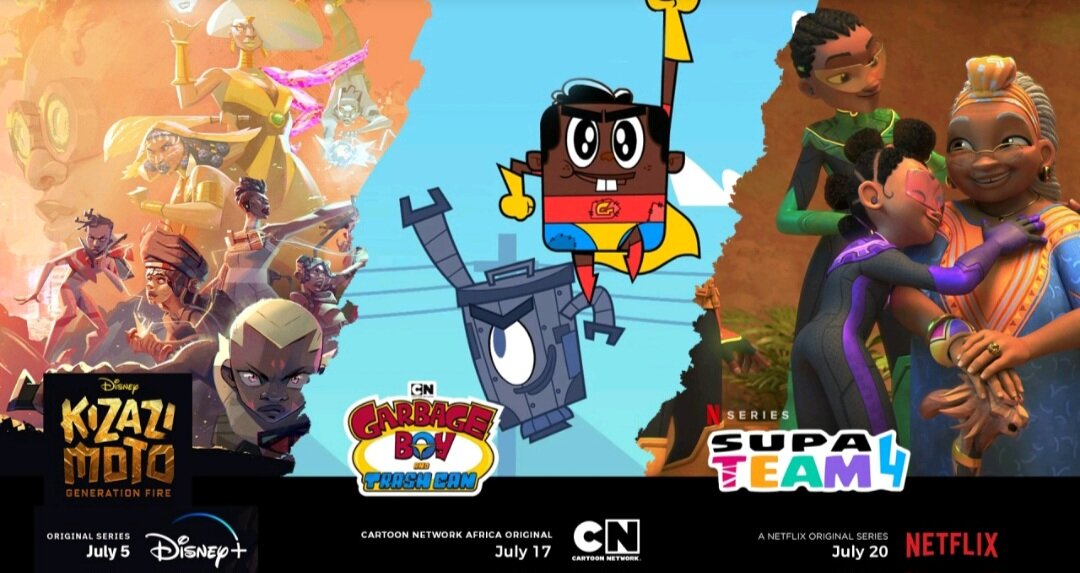Disney+ / Kizazi Moto - Cartoon Network / Garbage Boy and Trash Can / Netflix - Supa Team 4
African culture shone bright like a diamond this past weekend.
Forty thousand people gathered in Portimão, Portugal for the Afro Nation festival, while Nollywood was celebrated at the Essence Fest in New Orleans, which devoted an entire day to Nigeria's thriving film industry.
A suitable ending to a month of June in which the impact and influence of African creativity extended way beyond its natural borders.
Read on for more 👇
ANIMATION
The biggest news of the month was the buzz created by the premiere of 🔥'Kizazi Moto: Generation Fire'🔥, which comes out this Wednesday on Disney+
As I told Variety, I believe that this stunning project represents a watershed moment for the African animation industry.
💫 An anthology of 10 short films created by animators from 6 different African countries, 'Kizazi Moto' offers a 'dizzying blend of mythology, science fiction and Afrofuturism, presenting 10 bold, wholly original visions of the future from a distinctly African perspective (...) Collectively, they present a portrait of the continent that’s never been seen before', according to Variety's Christopher Vourlias.
❤️ This anthology is the result of a true labor of love from South African studio Triggerfish, who initiated the relationship with Disney and shepherded this project over many years.
💪🏾 It illustrates what African creators and animators can achieve when given the proper resources in terms of training, time and budget, and will without any doubt inspire and energize many young animators from across the continent.
Triggerfish presented a sneak peek of 'Kizazi Moto' earlier in June during the Annecy Animation Festival. With many African animators present at the screening, the buzz in the room was palpable.
Unfortunately I arrived in Annecy too late to live this moment, but I was able to see the 'Kizazi Moto' posters prominently displayed across the festival site.
🧐 'Kizazi Moto' executive producer and Oscar winner Peter Ramsey (“Spider-Man: Into the Spider-Verse”), hinted at potential follow ups for the project:
“There is stuff floating out there that could very well happen. I really hope it does,” he said. “I’m hoping we can do another ‘Kizazi Moto’ anthology or two, because there’s so many talented people here … There’s a lot to explore. A lot to tell.”
⛰ Besides the teasing of 'Kizazi Moto', this year's Annecy International Animation Festival was notable for its strong African contingent.
🚡 Over the last few years, Africa has been steadily building its presence at what is globally recognized as the largest and most prestigious animation event in the world, gathering some 15,000 animation professionals from 100+ countries.
🔦 In 2021, Africa was even given the 'Spotlight' at Annecy. Unfortunately, this coincided with the pandemic and the impact of the distinction was subdued.
💪🏿 But this year, animators from the continent came out in force:
✅ La Grotte sacrée (The Sacred Cave), directed by Daniel Minlo and Cyrille Masso will be representing Cameroon in Official Selection.
✅ 'Kizazi Moto' was showcased with the screening of several of its short films: 'Enkai' by Ng'endo Mukii (Kenya), 'Moremi' by Shofela Coker (Nigeria), and 'Surf Sangoma' by Nthato Mokgata (aka star musician Spoek Mathambo!) and Catherine Green (South Africa).
✅ Nigerian and Ghanaian animation studios joined forces to represent the West African ecosystem, with 11 projects slated to pitch during the festival. Among the studios in attendance were Magic Carpet Studios, Basement Animation, Smids Animation Studios, Jolly Squid Media & Animation, Folktail Studios, AnimaxFYB Studios and Leti Arts.
✅ Also pitching were filmmaker Mbithi Masya (Kenya) with 'Papo Hapo', Gisaburo Sugii and Arthell Isom (DRC) with 'Mfinda', animation studio Diprente with 'Junk Pilots' and I'm sure many more.
This solid and diverse contingent illustrates without a doubt that Africa's animation sector is gaining in strength and credibility.
As always, the talent is there. But much work remains to be done:
❌ We are still lacking large-scale, up-to-date, affordable and sustainable training programs to build and up-skill local technical capacity. Many actors are getting their hands dirty to solve this problem, including Triggerfish, Nuno Martins, Mounia Aram, Ferdy 'Ladi Adimefe, Francis Y. Brown, Sebastien Onomo, and Africa Digital Media Institute (ADMI).
❌ Disney and Netflix have been the first to give real production budgets to African animation projects. But beyond that, the number of buyers remain scarce. The links between African animation and the international markets still need to be strengthened.
❌ The African animation space is mostly comprised of small studios of 5-15 people operating independently. This is not the most efficient set-up to develop and produce world-class IP. The winners will be the ones who will build alliances and trade some control in exchange for a more diversified skill set, wider networks, and ultimately, increased revenue.
The month of July will bring more African animation firsts, with the release of Ridwan Moshood 'Garbage Boy and Trash Can' on Cartoon Network and Triggerfish's (them again!!) 'Supa Team 4' on Netflix.
Stay tuned.
MUSIC
🏆 Get ready to see more than Afrobeats win big at the next Grammys, as the famous music awards ceremony has just announced a new, wide-ranging African Music category.
🌍 Officially titled 'Best African Music Performance award', this new category will "recognize recordings that utilize unique local expressions from across the African continent," according to the Grammys website.
🎶 "Highlighting regional melodic, harmonic, and rhythmic musical traditions, the Category includes but is not limited to the Afrobeat, Afro-fusion, Afro Pop, Afrobeats, Alte, Amapiano, Bongo Flava, Genge, Kizomba, Chimurenga, High Life, Fuji, Kwassa, Ndombolo, Mapouka, Ghanaian Drill, Afro-House, South African Hip-Hop, and Ethio Jazz genres."
👌🏽 Well, first off, looks like the Grammys have caught the drift and are well aware of the diversity of contemporary African sounds.
📦 Some critics have warned that the inclusion of an Africa-focused category may put African artists in a box.
But can we agree that it's a big step up from the dusty 'World Music' label?
🤯 Between +500% and +900% in 5 years -- that's how much Afrobeats streams have increased on Spotify in lands as far removed from Africa as Australia, The Netherlands, or Mexico.
This remarkable growth has led the music platform to launch 'Afrobeats: Journey of a Billion Streams', a dedicated website serving as a comprehensive hub for all things Afrobeats.
😵 💫 On my side, I cannot seem to get Rema's 'Calm Down', the second most streamed Afrobeats song of all time (after CKay's 'Love Nwantiti'), out of my head.
🇹🇿 Meanwhile, Tanzanian musicians are also breaking records, even though they haven't really appeared yet on the radar of Western audiences. TZ superstar Diamond Platnumz's YouTube channel has now reached 7.7M subscribers and 2.2B views. As a comparison, Burna Boy's own channel has 3.92M subscribers and 2.1B views.
🏔 But this is just the tip of the iceberg.
🚀 According to IFPI, the music industry's annual source of data, Sub-Saharan Africa became the fastest growing music market in 2022 (+34.7%), largely driven by a significant revenue boost in South Africa (+31.4%).
This means that African artists will start to see a growing portion of their revenue coming from their own continent -- despite the glaring lack of proper music venues - rather than from 'the abroad'.
CREATECH
Vivatech, one of the world's largest tech events, also took place in Paris in June, and the numbers are in:
🎫 150,000 attendees
🌍 174 countries
🚀 2,400 startups
🏄🏻 1 President Macron crowd-surfing
😎 1 Elon Musk show
🔥 And also an extremely dynamic AfricaTechLab pavilion and AfricaTechAwards 2023, recognizing the top startups in the ClimateTech, HealthTech, and Fintech sectors, both sponsored by IFC.
🧐 I was there, with a mission to meet with African Creative Tech entrepreneurs and investors.
Although the concept of CreaTech is still extremely new and confusing for many, a significant number of today's biggest tech companies operate in that space -- think of streaming platforms like Netflix or Spotify, marketplaces like Etsy, fashion e-commerce sites like Farfetch, creator funding solutions like Patreon, design tools like Canva, or publishing solutions like Substack.
If we extend the concept to tech-enabled creative companies, then it's almost endless. Technology is now powering the production of most creative endeavors, especially in film, animation, gaming, and music.
But how does this sector translate to Africa? A few take-aways:
❌ First, a reality check: too many entrepreneurs are still trying to build the 'African Netflix' or 'African Spotify'. Take it from somebody who's been there -- you can't compete against the GAFAMs. If you are building a content platform, the only edge you may have is if you a) target the mass market/bottom of the pyramid and b) are embedded with one or several telco(s) and/or phone manufacturer(s) -- they are the ones who own your customers.
✅ There are opportunities in facilitating or driving the creation of premium IP at scale.
✅ There are opportunities in getting African creative products ready for export, and in connecting African brands to global markets.
✅ There are opportunities in facilitating cross-border payments in various currencies to creators or freelancers.
✅ There are opportunities in training African creatives to global standards and connecting them with global remote jobs.
⚠️ Be aware that the VC funding model might not be the right one for your company. VCs are looking to make a 10x return on their investment over 5 years. If you cannot realistically paint such a scenario for your company, you can still be very successful, but you should be approaching other types of investors (angels, impact funds, PE or micro-PE, banks, etc).
PODCASTS
And finally, looks like June was also podcast month for me, as I was privileged to be given space to share my thoughts in not only one, but TWO leading African business podcasts.
🎙First, I spoke with Terser Adamu in his Unlocking Africa Podcast about Africa's on-going Cultural Renaissance.
👀 The world's gaze is now turned towards the continent in search of creative inspiration. How can African artists, talents and creatives take advantage of this moment?
We spoke about:
✅ How, after starting out as a journalist some 20 years ago, I came to see my role as a connector, facilitator and catalyst, serving as a link between the continent and global investors
✅ Why I believe that African music, film, fashion and sports are the continent's biggest exports
✅ How governments can harness the soft power of their creative and sports industries to propel their countries and the continent forward
✅ More specifically, what are some of the strategies that could be applied to Africa's film sector
✅ Actionable advice to aspiring filmmakers and content creators who want their work to reach a global audience
I was also invited to chat with Isaac Aboah and Daniel Merki, co-hosts of the Change Africa Podcast.
The main question I asked was: Are African artists benefiting from the arrival of global entertainment companies on the continent or are they falling into an exploitative model?
📢 I also discussed today's multi-faceted African Creative and Sports landscape - challenges, triumphs, and potential - as well as my personal journey from journalist to entrepreneur and investor:
✅️ How I co-created The XYZ Show, a groundbreaking political satire show in Kenya
✅️ How I survived launching a video streaming platform when the African tech scene was still more a concept than a reality
✅️ The exciting growth of the African Creative industries over the past 15 years
✅️ The pivotal role played by the digital platforms as catalysts for the global reach and visibility of African content
✅️ The importance of nurturing African talent and investing in developing quality IP
✅️ My widely shared UNESCO report on the African audiovisual sector
✅️ The industry 's need for more large-scale educational initiatives and physical infrastructure
Let me know what you thought about both episodes - would love to get your feedback.

